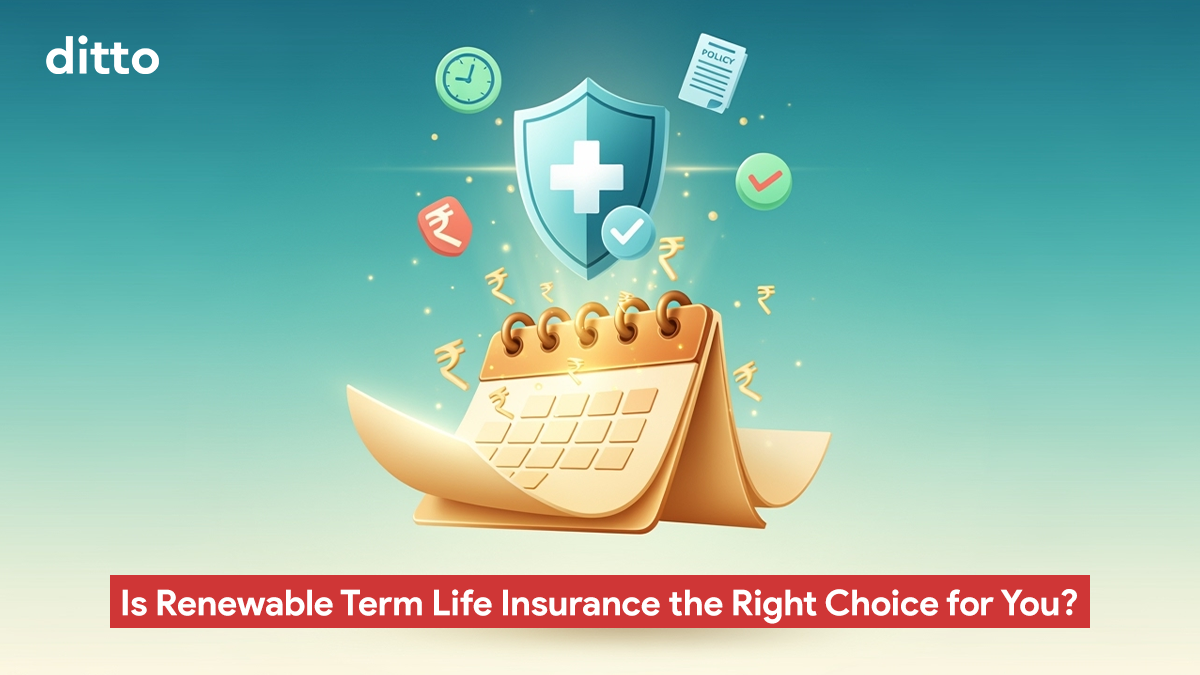| What is Renewable Term Life Insurance? Renewable term life insurance is a policy that lets you extend your coverage when it matures without needing a new medical exam. While the death benefit remains the same, the premium increases based on your age at renewal. This offers peace of mind by ensuring continued protection even if your health changes. While widely adopted overseas, it is still relatively uncommon in India’s retail term insurance market. |
When you buy a term plan in India, you usually pick a fixed duration, say 20, 30, or even 40 years. Once that term is over, the cover ends too. If you want protection beyond that, you’d need to buy a fresh policy, which could mean new medical tests, higher premiums, and sometimes even rejection if your health status has changed.
But abroad, there’s a slightly different concept: Renewable Term Life Insurance. This lets you extend your cover when the policy matures, without going through medical exams all over again. The death benefit stays the same, though the premiums rise with age. It’s a way to ensure continued peace of mind, even if your health takes a turn later.
Looking for flexible life insurance coverage? Compare renewable term life insurance plans with Ditto today and secure peace of mind for your future.
| Renewable Term Life Insurance: The Global Scenario United States: In the US, renewable term policies like State Farm’s Select Term offer coverage that can be renewed annually, sometimes up to age 95. When the original term ends (say after 10, 20, or 30 years), policyholders have the guaranteed right to continue their insurance for another term, often a single year at a time. No new medical exam is needed, even if the policyholder’s health has worsened. However, the premium is recalculated based on the insured’s current age, so it increases at each renewal. This setup provides peace of mind to those concerned about their future insurability, but the growing cost year-on-year can make long-term renewals expensive. Canada: Canada’s renewable term products, such as RBC’s YourTerm, work similarly. After an initial term (commonly 10 or 20 years), the policyholder can renew the coverage each year. The renewal is automatic and does not require additional medical checks. Premiums rise each year as the insured ages. The ongoing annual renewal makes these policies useful for individuals who might want to reassess their needs frequently or retain coverage despite developing health issues, but the premium increases can be steep in later years. UK: In the UK, renewable term assurance policies are usually set up in 5–10-year blocks. At the end of each block, the policyholder has a guaranteed option to renew for another term, provided they are below the insurer’s upper renewal age, often 75. No fresh health evidence is needed for each renewal. This incremental structure gives flexibility and ongoing access to coverage, matching the changing needs as life circumstances evolve. The relatively shorter renewal block (versus annual) can also help smooth out premium jumps somewhat. Singapore: Singapore’s Singlife Elite Term II is an example of a renewable term plan that allows renewals every 5 or 10 years, right up to age 89. The automatic renewal feature, without the hassle of new medical tests, makes it convenient. This is crucial in a city where insurance needs may change as people age or their financial responsibilities shift. Each renewal sees the premium recalculated for the current age, but continued eligibility is guaranteed until the maximum age allowed. |
In India, renewable term life insurance is rare in retail term plans and is mostly seen in group or government schemes. Here are a few examples:
- LIC’s One-Year Renewable Group Term Assurance and ICICI Prudential’s Group Term Plus provide life coverage to members of an organization, group, or alumni association, with coverage typically renewed annually by the employer or the group administrator. Members do not undergo individual medical exams for each renewal, making it convenient for large groups.
- The Pradhan Mantri Jeevan Jyoti Bima Yojana (PMJJBY) is a popular government-backed scheme offering life insurance coverage of ₹2 lakh for one year. This policy is renewable annually at a flat premium, ensuring affordable and accessible life cover for a broad population base.
- Most term life insurance plans sold to individuals in India have fixed tenures. Once the term expires, the coverage ceases.
An exception is HDFC Life's Click 2 Protect Supreme plan, which offers a “Renewability at Maturity” feature that allows policyholders to extend their coverage multiple times after the original term ends. But it is subject to conditions like fresh medical checks and premium adjustments.
As you can see, renewable term features are rare and less automatic in Indian retail life insurance compared to global markets.
How Renewable Term Life Insurance Works?Here are the key features of renewable term plans:
1) Applicability: Renewable term insurance is common worldwide, especially in group and individual plans; in India, it is mostly offered via group or government schemes.
2) Premiums: Premiums increase with every renewal period due to aging.
3) Maximum Renewal Age: Globally, policies typically allow renewals until ages between 65 and 95, depending on the insurer. In India, renewal age limits vary by policy and scheme.
4) Death Benefit: The death benefit remains the same throughout renewals unless you choose to change it.
5) Renewal Process: No new medical exams are needed when renewing. The premium is recalculated based on your current age, meaning premiums increase as you get older.
6) Tenure: The policy is offered for short terms like 1, 5, or 10 years, with the option to renew at the end of each term, ensuring continuous protection.
Factors Affecting the Premiums in Renewable Term Policies
Premiums for renewable term life insurance increase each time the policy is renewed. Several factors influence how much the premium rises:
- Attained Age: Premiums are recalculated at every renewal based on your current age. Since risk increases with age, premiums naturally become higher as you grow older.
- Policy Duration: Shorter-term policies often start with lower premiums but experience steeper increases when renewed. Longer-term policies tend to have more stable premiums.
- Lifestyle & Occupation: Your lifestyle choices, such as smoking or consumption of alcohol, and your occupation also impact premiums. In addition, high-risk professions like mining or aviation lead to higher premiums due to greater risk exposure.
- Sum Assured: The amount of coverage you choose directly affects your premiums. A higher sum assured means the insurer takes on more risk, so premiums increase accordingly.
- Group vs Retail: Group insurance plans, often provided by employers, benefit from risk pooling, which usually results in lower premiums compared to individual retail policies.
- Inflation and Claims Experience: Insurers regularly review claims data and inflation trends. If claims increase or inflation rises, renewal premiums may be adjusted to reflect higher anticipated costs.
Premiums for renewable term insurance consistently rise with age; understanding these factors helps plan finances and avoid unexpected premium hikes.
Who Should Buy Renewable Term Insurance?
Renewable term insurance is especially suitable for people with specific needs for flexibility and short-term coverage:
- Those Seeking Coverage for a Set Period: If you require life insurance protection during particular phases of life, renewable term insurance offers the peace of mind that you remain covered during these crucial financial responsibilities. You can choose a coverage period that matches your current needs and renew as necessary.
- Individuals with Uncertain Health: For those who may have health concerns or anticipate changes in their health, renewable term policies allow guaranteed renewability without the need for new medical exams at each renewal. This means your coverage isn’t jeopardized by a decline in health, ensuring you remain protected.
- Professionals with Fluctuating Career Paths: Many people experience changes in career and income levels, sometimes shifting jobs or industries. Renewable term insurance is ideal for these individuals because it does not require a long-term commitment up front and allows them to maintain coverage without undergoing frequent medical checkups.
- Members of Employer Groups or Associative Plans: Group insurance policies often include renewable term options, allowing employees and members to benefit from continued life coverage through their organization without the hassle of individual underwriting on renewal.
How Does India Differ from Global Markets?
In many global markets, life insurers typically guarantee premium rates only for a fixed duration, such as 10, 20, or 30 years. This creates demand for renewable term plans, allowing policyholders to extend coverage once the guaranteed period ends.
India operates differently. When you purchase a term plan here, you must choose your desired tenure upfront. Even if you opt for the maximum available tenure coverage until age 85, 99, or 100, your premium is fixed indefinitely under IRDAI regulations. This eliminates the need for renewable term features but places the responsibility of selecting the right tenure squarely on the policyholder.
Why Tenure Selection Matters? Choosing a shorter tenure with the intention to extend later can present challenges, such as: a) Higher premiums due to increased age at renewal. b) Fresh health evaluations that may lead to disqualification. c) Limited or no renewal options in most retail term plans. Conversely, selecting a slightly longer tenure upfront may mean higher initial costs, but it ensures uninterrupted coverage through your most critical earning years. Over time, this approach offers greater peace of mind and stronger financial security. |
Why Talk to Ditto for Term Insurance?
At Ditto, we’ve assisted over 8,00,000 customers with choosing the right insurance policy. Why customers like Arun below love us:

✅No-Spam & No Salesmen
✅Rated 4.9/5 on Google Reviews by 15,000+ happy customers
✅Backed by Zerodha
✅Dedicated Claim Support Team
✅100% Free Consultation
You can book a FREE consultation here. Slots are running out, so make sure you book a call now.
Ditto’s Take on Renewable Term Life Cover
Renewable term life insurance has not gained much traction in India’s retail term insurance space. Here, renewable options are generally offered only under group insurance plans or certain government-backed schemes. For most individuals purchasing term insurance directly, this means renewal at the end is not guaranteed.
This makes selecting the right term length at the outset especially important. If the term is too short, you may face challenges later, such as higher premiums, stricter health checks, or even the inability to renew, potentially leaving you uninsurable.
By opting for a slightly longer term and extending your coverage by 5 to 10 years at the time of purchase, you may only incur a modest premium increase, typically around 10 to 20 percent. This relatively small additional cost can provide the invaluable benefit of extended protection, ensuring your family remains financially secure for a longer period.
At Ditto, we generally recommend choosing coverage until age 60 to 65. However, if your liabilities or dependents are likely to extend further, selecting a term up to age 70 to 75 can offer added peace of mind. Moreover, if you achieve your financial goals earlier than expected and become financially independent, you can always choose to discontinue the policy, making the premium cost less significant when coverage is no longer needed.
Frequently Asked Questions (FAQs)
Can I switch to another insurer for renewable term insurance?
No, renewed coverage applies to your current insurer only. Switching to a new insurer means buying afresh, medical checks, and new premiums.
Does the premium go up at renewal?
For renewable term plans, once the tenure or lock-in period ends, premium rates increase based on your attained age at renewal. In contrast, for most Indian retail term plans, premiums remain fixed for the entire duration once purchased.
What happens if I miss a renewal deadline?
Coverage lapses automatically; you'll need to reapply or buy a new policy, often with higher costs or stricter underwriting.
Last updated on:










